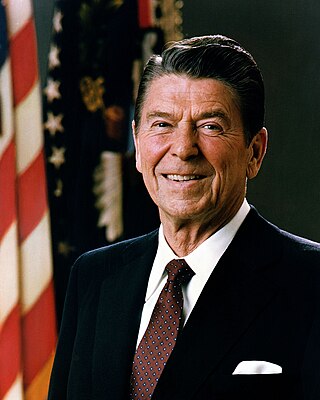
Ronald Wilson Reagan was an American politician and actor who served as the 40th president of the United States from 1981 to 1989. A member of the Republican Party, his presidency constituted the Reagan era, and he is considered one of the most prominent conservative figures in American history.

The "Evil Empire" speech was a speech delivered by U.S. President Ronald Reagan to the National Association of Evangelicals on March 8, 1983 at the height of Cold War and Soviet-Afghan War. In that speech, Reagan referred to the Soviet Union as an "evil empire" and as "the focus of evil in the modern world". Reagan explicitly rejected the notion that the United States and the Soviet Union were equally responsible for the Cold War and the ongoing nuclear arms race between the two nations; rather, he asserted that the conflict was a battle between good and evil.

The Reagan Doctrine was stated by United States President Ronald Reagan in his State of the Union address on February 6, 1985: "We must not break faith with those who are risking their lives—on every continent from Afghanistan to Nicaragua—to defy Soviet-supported aggression and secure rights which have been ours from birth." It was a strategy implemented by the Reagan Administration to overwhelm the global influence of the Soviet Union in the late Cold War. The doctrine was a centerpiece of United States foreign policy from the early 1980s until the end of the Cold War in 1991.

The history of the United States from 1980 until 1991 includes the last year of the Jimmy Carter presidency, eight years of the Ronald Reagan administration, and the first three years of the George H. W. Bush presidency, up to the collapse of the Soviet Union. Plagued by the Iran hostage crisis, runaway inflation, and mounting domestic opposition, Carter lost the 1980 United States presidential election to Republican Reagan.

The United States Third Fleet is one of the numbered fleets in the United States Navy. Third Fleet's area of responsibility includes approximately fifty million square miles of the eastern and northern Pacific Ocean areas including the Bering Sea, Alaska, the Aleutian Islands, and a sector of the Arctic. Major oil and trade sea lines of communication within this area are critically important to the economic health of the United States and friendly nations throughout the Pacific Rim region.
The Insular Cases are a series of opinions by the Supreme Court of the United States in 1901 about the status of U.S. territories acquired in the Spanish–American War. Some scholars also include cases regarding territorial status decided up until 1914, and others include related cases as late as 1979. The term "insular" signifies that the territories were islands administered by the War Department's Bureau of Insular Affairs. Today, the categorizations and implications put forth by the Insular Cases still govern the United States' territories.

The Berlin Wall Speech was delivered by United States President Ronald Reagan in West Berlin on June 12, 1987. The speech is commonly known by a key line from the middle part: "Mr. Gorbachev, tear down this wall!" Reagan called for the General Secretary of the Communist Party of the Soviet Union, Mikhail Gorbachev, to open the Berlin Wall, which had encircled West Berlin since 1961.
Downes v. Bidwell, 182 U.S. 244 (1901), was a case in which the US Supreme Court decided whether US territories were subject to the provisions and protections of the US Constitution. The issue is sometimes stated as whether the Constitution follows the flag. The decision narrowly held that the Constitution does not necessarily apply to territories. Instead, the US Congress has jurisdiction to create law within territories in certain circumstances, particularly those dealing with revenue, which would not be allowed by the Constitution for US states. It has become known as one of the "Insular Cases".

The 1984 Republican National Convention convened on August 20 to August 23, 1984, at Dallas Convention Center in downtown Dallas, Texas. The convention nominated President Ronald W. Reagan and Vice President George H. W. Bush for reelection.
DeLima v. Bidwell, 182 U.S. 1 (1901), was one of a group of the first Insular Cases decided by the US Supreme Court.

The 1980 Republican National Convention convened at Joe Louis Arena in Detroit, Michigan, from July 14 to July 17, 1980. The Republican National Convention nominated retired Hollywood actor and former Governor Ronald Reagan of California for president and former Representative George H. W. Bush of Texas for vice president.

The Ronald Reagan Ballistic Missile Defense Test Site, commonly referred to as the Reagan Test Site, is a missile test range in Marshall Islands. It covers about 750,000 square miles (1,900,000 km2) and includes rocket launch sites at the Kwajalein Atoll, Wake Island, and Aur Atoll. It primarily functions as a test facility for U.S. missile defense and space research programs. The Reagan Test Site is under the command of the US Army Kwajalein Atoll, or USAKA.
Psychological Operations in Guerrilla Warfare was a manual written by the Central Intelligence Agency (CIA) for the Nicaraguan Contras, who were involved in a civil war with the Nicaraguan government. It was revealed by the Associated Press on October 15, 1984. The ninety-page book of instructions focused mainly on how "Armed Propaganda Teams" could build political support in Nicaragua for the Contra cause through deceit, intimidation, and violence. The manual also discussed assassinations. The International Court of Justice case Nicaragua v. United States found that the publication of this manual had "encouraged acts ... contrary to general principles of humanitarian law." However, the CIA claimed that the purpose of the manual was to "moderate" the extreme violence already being used by the Contras.

The islands of Samoa were originally inhabited by humans as early as 850 BC. After being invaded by European explorers in the 18th century, by the 20th and 21st century, the islands were incorporated into Samoa and American Samoa.

The second inauguration of Ronald Reagan as president of the United States was held in a televised ceremony on January 20, 1985, at the White House, and was repeated the following day, January 21, 1985, at the Capitol's rotunda. This was the 50th presidential inauguration and marked the commencement of the second and final four-year term of both Ronald Reagan as president and of George H. W. Bush as vice president. At 73 years, 349 days of age on Inauguration Day, Reagan was the oldest U.S. president to be inaugurated, until Joe Biden's inauguration as president on January 20, 2021, at the age of 78 years, 61 days.
Taylor v. Louisiana, 419 U.S. 522 (1975), was a landmark decision of the US Supreme Court which held that systematically excluding women from a venire, or jury pool, by requiring (only) them to actively register for jury duty violated the defendant's right to a representative venire. The court overturned Hoyt v. Florida, the 1961 case that had allowed such a practice.
Hunter v. Underwood, 471 U.S. 222 (1985), was a case in which the Supreme Court of the United States unanimously invalidated the criminal disenfranchisement provision of § 182 of the Alabama Constitution as a violation of the Equal Protection Clause of the Fourteenth Amendment to the U.S. Constitution.

The political status of Puerto Rico is that of an unincorporated territory of the United States officially known as the Commonwealth of Puerto Rico. As such, the island of Puerto Rico is neither a sovereign nation nor a U.S. state.
Caliga v. Inter Ocean Newspaper Co., 215 U.S. 182 (1909), was a United States Supreme Court case in which the Court held a person cannot file a second copyright claim to amend the first, even if the first was determined to be invalid.











